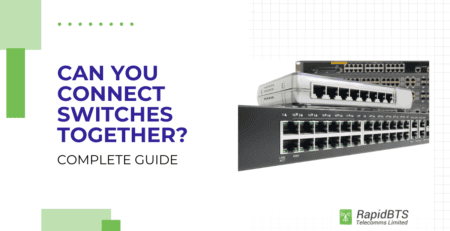The Advantages and Disadvantages of Routers in Networking
Whether you’re a business owner, a tech enthusiast, or a home user, understanding the advantages and disadvantages of routers is essential for making informed decisions about your networking needs.
Routers are the backbone of any network, and they offer numerous benefits. With their ability to connect multiple devices and manage traffic, routers provide seamless connectivity throughout your space.
While routers bring convenience and efficiency to networking, they also have their drawbacks. One disadvantage is the potential for network congestion, especially in large or heavily populated areas. In this article, we will dive deeper into the advantages and disadvantages of routers in networking, helping you weigh the pros and cons to make well-informed decisions for your network infrastructure.
What are Routers and their Role in Networking?
Routers are essential devices in modern networking, acting as intermediaries that facilitate communication between different networks. They receive, analyze, and forward data packets between computers, devices, and various networks, ensuring that information reaches its intended destination efficiently.
At a fundamental level, routers operate by using routing tables and protocols to determine the best path for data transmission. They can connect to various types of networks—such as local area networks (LANs), wide area networks (WANs), or even the Internet—making them versatile tools in any networking setup.
In a home setting, for instance, a router can connect personal computers, smartphones, and smart appliances, allowing them to communicate and share resources, such as printers or internet access.
In addition to their primary function of directing traffic, routers also provide a layer of security by managing data traffic and preventing unauthorized access. By employing firewall capabilities and network address translation (NAT), routers can protect the internal network from external threats.
Advantages of Using Routers
The use of routers in networking brings numerous advantages that enhance both the performance and security of network systems.
Increased Network Efficiency and Performance
One of the most notable benefits of routers is their ability to significantly increase network efficiency and performance. As routers analyze traffic patterns and manage data flow, they optimize the delivery of information across the network. This optimization is crucial in environments where multiple devices are competing for bandwidth.
In addition to managing bandwidth, routers utilize advanced technologies such as Quality of Service (QoS) to prioritize critical applications. For example, in a business setting where video conferencing and VoIP are essential, routers can prioritize these services over less critical activities like file downloads.
Furthermore, modern routers are equipped with dual-band or tri-band capabilities, which allow them to operate on multiple frequencies. This feature is particularly beneficial in crowded environments, such as urban areas or large offices, where multiple networks may overlap.
Enhanced Network Security and Protection
Routers contribute significantly to network security through various built-in features that help protect sensitive data and prevent unauthorized access. One of the primary methods routers use for security is Network Address Translation (NAT), which masks internal IP addresses and makes it more difficult for external entities to target devices on the network.
Additionally, many modern routers come equipped with advanced firewall capabilities. These firewalls serve as a barrier between the internal network and potential threats from the outside world. This proactive approach to security is essential for businesses that handle sensitive customer information or proprietary data, as it mitigates the risk of data breaches and cyber-attacks.
Moreover, routers often support Virtual Private Networks (VPNs), which further enhance security by encrypting data transmitted over the network. This is especially important for remote workers or businesses that require secure access to their internal networks from outside locations.
Flexibility and Scalability in Network Design
Routers can easily adapt to different environments and requirements, catering to both small home networks and large enterprise setups. This adaptability allows users to customize their network configurations to meet specific needs, whether it’s adding new devices, expanding coverage, or integrating with other networking technologies.
Scalability is another significant advantage that routers provide. As businesses grow, their networking requirements often change. Routers can accommodate this growth by supporting additional devices and users without necessitating a complete overhaul of the existing infrastructure. For instance, a small business can start with a basic router and, as its operations expand, upgrade to more powerful routers that support increased bandwidth and additional features.
Furthermore, routers facilitate the integration of new technologies, such as IoT devices and cloud-based services. Routers can support various protocols and standards, making it easier to incorporate new technologies without disrupting existing operations.
Simplified Network Management and Troubleshooting
Managing a network can be a complex task, but routers simplify this process through various management features and tools. Many modern routers come with user-friendly interfaces that allow administrators to configure settings, monitor traffic, and manage connected devices with ease.
In addition to user-friendly interfaces, routers often include diagnostic tools that help identify and resolve connectivity problems. For instance, if a device experiences slow internet speeds, the router can provide insights into potential causes, such as bandwidth hogs or network interference. By offering real-time feedback, routers enable users to make informed decisions about how to optimize their network performance.
Moreover, many routers support remote management capabilities, allowing administrators to monitor and configure networks from virtually anywhere. This is particularly beneficial for businesses with multiple locations or remote employees, as it provides the flexibility to manage resources without being physically present.
Disadvantages of Routers
While routers offer numerous advantages, they also come with several disadvantages that users should consider.
Cost of Implementation and Maintenance
The financial implications of implementing and maintaining routers can be significant, especially for businesses. Quality routers, particularly those equipped with advanced features such as dual-band capabilities, security protocols, and scalability options, often come with a hefty price tag.
In addition to the initial investment, businesses must also consider the expenses related to the upkeep of routers. Regular firmware updates, security patches, and general maintenance are necessary to ensure optimal performance and security.
Failing to maintain routers can lead to vulnerabilities that may expose the network to cyber threats, resulting in potential data breaches and associated costs. Organizations must allocate resources for ongoing management, which can strain smaller budgets.
Moreover, the need for skilled personnel to manage networking equipment can further complicate financial considerations. Organizations may need to hire or train IT staff to handle the complexities of router configuration, troubleshooting, and optimization. This requirement can add another layer of expense, as technical expertise is essential for maintaining a secure and efficient network.
Complexity in Configuration and Setup
The complexity of configuring and setting up routers is another challenge that can deter users, particularly those without technical expertise. While many routers come with user-friendly interfaces, the sheer number of settings and options available can be overwhelming for novice users.
Configurations such as setting up security protocols, managing IP addresses, and optimizing bandwidth require a level of understanding that not all users possess. This complexity can lead to misconfigurations, which can compromise network performance and security.
Additionally, the process of integrating routers into existing network infrastructures can pose challenges. In environments where multiple devices and systems are already in place, ensuring compatibility and seamless communication can be a daunting task. Users may encounter issues related to outdated hardware, conflicting settings, or incompatible protocols, necessitating troubleshooting and adjustments.
Furthermore, as technology evolves, routers must be updated to keep pace with the latest standards and security practices. This need for continual learning and adaptation can be demanding, particularly for organizations that lack dedicated IT resources. Staying informed about new technologies, protocols, and security measures is essential for effective router management, but it can be a considerable burden for those unfamiliar with the intricacies of networking.
Conclusion
Making the right choice for your network infrastructure requires carefully weighing both the advantages and disadvantages of routers. While challenges like initial costs and setup complexity exist, the benefits of enhanced security, improved efficiency, and network scalability make routers indispensable in our connected world.
At RapidBTS, we’re committed to helping you build the perfect networking solution. Our expert team offers a carefully selected range of wireless routers and access points. We understand that every network is unique, which is why we provide free consultations to determine the best solution for your specific needs.
Contact our networking specialists today to explore our range of enterprise-grade routers and access points.












